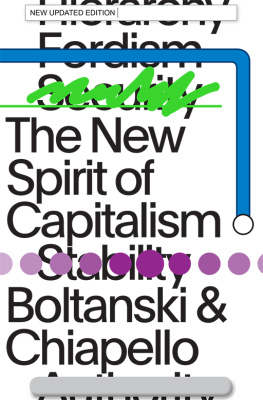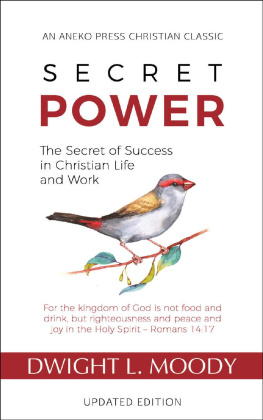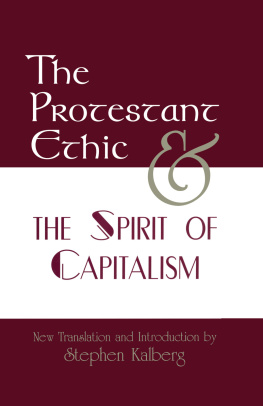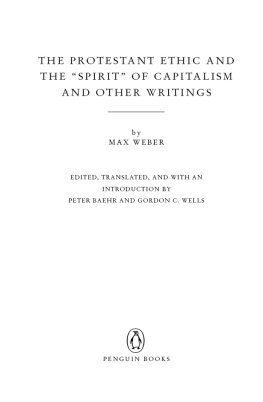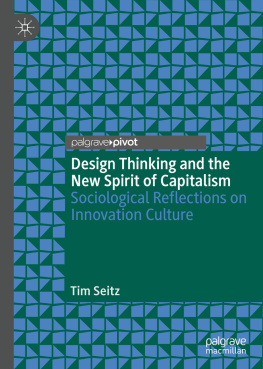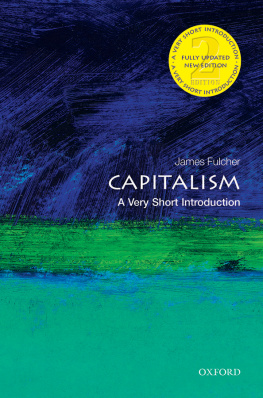Luc Boltanski - The New Spirit of Capitalism (2017 updated edition)
Here you can read online Luc Boltanski - The New Spirit of Capitalism (2017 updated edition) full text of the book (entire story) in english for free. Download pdf and epub, get meaning, cover and reviews about this ebook. year: 2017, publisher: Verso Books, genre: Politics. Description of the work, (preface) as well as reviews are available. Best literature library LitArk.com created for fans of good reading and offers a wide selection of genres:
Romance novel
Science fiction
Adventure
Detective
Science
History
Home and family
Prose
Art
Politics
Computer
Non-fiction
Religion
Business
Children
Humor
Choose a favorite category and find really read worthwhile books. Enjoy immersion in the world of imagination, feel the emotions of the characters or learn something new for yourself, make an fascinating discovery.
- Book:The New Spirit of Capitalism (2017 updated edition)
- Author:
- Publisher:Verso Books
- Genre:
- Year:2017
- Rating:4 / 5
- Favourites:Add to favourites
- Your mark:
- 80
- 1
- 2
- 3
- 4
- 5
The New Spirit of Capitalism (2017 updated edition): summary, description and annotation
We offer to read an annotation, description, summary or preface (depends on what the author of the book "The New Spirit of Capitalism (2017 updated edition)" wrote himself). If you haven't found the necessary information about the book — write in the comments, we will try to find it.
The New Spirit of Capitalism (2017 updated edition) — read online for free the complete book (whole text) full work
Below is the text of the book, divided by pages. System saving the place of the last page read, allows you to conveniently read the book "The New Spirit of Capitalism (2017 updated edition)" online for free, without having to search again every time where you left off. Put a bookmark, and you can go to the page where you finished reading at any time.
Font size:
Interval:
Bookmark:




Ouvrage publi avec le concours du Ministre franais charg de la culture Centre national du livre.
This work was published with the help of the French Ministry of Culture Centre national du livre.
This work, published as part of the program of aid for publication,
received support from the French Ministry of Foreign Affairs and the
Cultural Service of the French Embassy in the United States.
Further support was gratefully received through a research
fund allocated by the HEC Foundation, Paris.
This English-language edition published by Verso 2018
First English-language edition published by Verso 2005
Verso 2005, 2018
First published as Le nouvel esprit du capitalisme
ditions Gallimard 1999
Translation Gregory Elliott 2005, 2018
All rights reserved
The moral rights of the authors have been asserted
1 3 5 7 9 10 8 6 4 2
Verso
UK: 6 Meard Street, London W1F 0EG
US: 20 Jay Street, Suite 1010, Brooklyn, NY 11201
versobooks.com
Verso is the imprint of New Left Books
ISBN-13: 978-1-78663-325-5
ISBN-13: 978-1-78663-326-2 (UK EBK)
ISBN-13: 978-1-78663-327-9 (US EBK)
British Library Cataloguing in Publication Data
A catalogue record for this book is available from the British Library
Library of Congress Cataloging-in-Publication Data
A catalog record for this book is available from the Library of Congress
Typeset in Garamond
Printed in the US by Maple Press
For Guy
The New Spirit of Capitalism appeared in French in December 1999, almost seventeen years ago, and there has been no flagging of interest in it since, either in France or abroad. Its career is ongoing, with new translations and reprints every year for example, by Verso this year. Its authors have likewise continued their careers, tackling different subjects and, in their own fashion and at their own pace, producing a sequel to the book. The latter does not always follow on from it directly, but has involved returning to five years work together and the fruits of an unusual collaboration between an experienced sociologist, who had published two books directly linked to The New Spirit of Capitalism (De la Justification
Rather than return to the context of 199599, when we worked together, and respond to criticisms that have been addressed to us something we have done in previous prefaces we have decided to evoke in our own voices not the book itself but the way that, in some of the work we have undertaken separately since, we have pursued some of the tracks we embarked on together.
Luc Boltanski
Since the publication of The New Spirit of Capitalism, I have pursued my work in various directions, leading to the publication of four books. Although devoted to subjects that prima facie seem very different, they form part of a series whose objective is to develop a sociology of modernity, as largely dominated by developments in capitalism over recent decades.
Like The New Spirit of Capitalism, the first of these books, The Foetal Condition: A Sociology of Engendering and Abortion, whose effects can still be felt today, with even greater intensity than in the immediate aftermath of May 68.
However, it should be noted that these events had contrasting practical consequences in the different areas studied. In the sphere of work and production, the reaction to them saw the governing bodies of capitalism regain control, resulting in increased exploitation of labour. This was achieved by re-engineering enterprises and by massive unemployment, mainly attributable to relocation of production to low-wage countries. These phenomena are at the heart of our analyses in The New Spirit of Capitalism. By contrast, in the domain of biopolitics, buoyed by the development of feminist movements, by a more pronounced demand for autonomy, and also by a new ecological awareness, the events resulted in the legally sanctioned acquisition of new freedoms, which are nevertheless still contested and remain fragile.
In a second book, On Critique: A Sociology of Emancipation,the sense that each of its elements seems to support the effectiveness of the others. In historical situations where this reality appears to come undone, as is notably the case when economic crises and/or innovative social movements develop, actors can endeavour to shape what, in their everyday life, is rooted in their experience of the world, to translate it into a language and, when they meet with a response, to convert it into political demands, in an attempt to transform the contours of reality through critique.
To understand such operations, we must say a little about the mechanisms whose task is to construct reality and make it cohere. This is where the second set of concepts presented in On Critique comes in. Its objective is a clearer understanding of the role of institutions understood as incorporeal beings or, if you like, fictions which, precisely because they are disembodied, unlike ordinary actors who are always socially situated by dint of their engagement in a body, are tasked with saying how things stand with what is, in principle for everyone and from an overarching standpoint: that is, with defending the very tenor of reality. In this theoretical mechanism, critique assumes its true significance, especially as regards the institutions at which it is directed. Accordingly, the path to emancipation is construed as a dynamic aiming, as it were, to deconsecrate institutions, including the state (at least if it is regarded as an absolute), so as to envisage political orders based on recognition of the uncertainty inhabiting reality and the possibility of changing its contours that is, recognition of the necessity of critique.
The next step, presented in Mysteries and Conspiracies, which was published in 2012, sought to pursue this analysis of modernity by taking as its subject the nation-state as it developed in Europe from around the late nineteenth century that is (to adopt Foucaults formula), the state in the age of biopolitics. The mission of biopolitics is to act as guarantor of the tenor of reality and, utilizing the natural sciences, technology and social science, to render it predictable by reducing the uncertainty that always threatens to invest social existence. The book relies on seemingly disparate phenomena in the sphere of literature, the emergence and rapid, exponential development of crime fiction and spy novels; in psychiatry, the invention of a new nosological entity, paranoia; in political life, the interconnected multiplication of accusations of conspiracy and counter-accusations of indulging in conspiracy theories; and, in the domain of knowledge, the public success of the social sciences particularly sociology, in so far as it serves on the one hand to establish institutional reality, when put to work in a logic of expertise, and on the other to support the critique of institutional reality.
Font size:
Interval:
Bookmark:
Similar books «The New Spirit of Capitalism (2017 updated edition)»
Look at similar books to The New Spirit of Capitalism (2017 updated edition). We have selected literature similar in name and meaning in the hope of providing readers with more options to find new, interesting, not yet read works.
Discussion, reviews of the book The New Spirit of Capitalism (2017 updated edition) and just readers' own opinions. Leave your comments, write what you think about the work, its meaning or the main characters. Specify what exactly you liked and what you didn't like, and why you think so.

